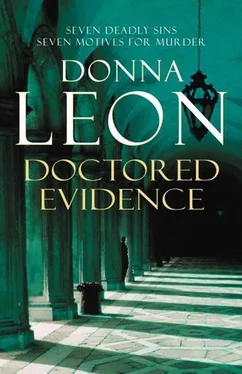Then she said she no longer wanted the money and would tell everyone about him. The windows were open, and she started to walk towards them, saying she was going to scream to the entire city that he was a false doctor. After that, he maintained, he didn't remember anything until she was lying on the floor. He said it had been like waking up from a nightmare, seeing her there. When Brunetti questioned him, he said he had no memory of hitting her, had not realized he had done it until he saw the bloody statue in his hand.
Brunetti, when he heard this, had thought it a particularly uninventive thing to say, but then the whole confession, aimed as it was at exoneration, was not much more inventive. Rossi's lawyer had sat solemn-faced through it all, had at one point even made what sounded like sympathetic noises.
Fear, Rossi said, had driven him from the house. No, he didn't remember wiping off the statue. Because he didn't remember anything, you see; he didn't remember killing her, only her screaming and hitting at him.
It was Brunetti's visit to his office that had driven him to search Signora Battestini's attic. Yes, he knew about the letter from the University of Padova: it had haunted his life for years. He had added the non-existent degree to his curriculum vitae years ago, just after the birth of his first child, when he needed a better job in order to support his family. He had paid a print shop to make the fake diploma for him to increase his chances of getting a job. He lived in fear of exposure, he said: this must have affected him when he found himself with Signora Battestini. He was a victim of his terror just as he was a victim of her greed.
The night after the questioning, when Brunetti told Paola, he used Rossi's word, 'victim', and said it would be the key to his defence.
'He's a victim, you see,' he repeated while they sat in her study. They were inside, having left Raffi and Sara alone on the balcony to do whatever young people do together in the soft light of a late summer evening, with a view across the rooftops of Venice before them.
'And Signora Battestini's not,' Paola said. She did not phrase it as a question but as an assertion, a truth that extended to cover all those who were already dead and thus no longer of any use. Brunetti remembered then one of the grimmer remarks attributed to Stalin: 'No man, no problem.'
'What will happen to him?' Paola asked.
Brunetti could not say with any certainty, but he could make a guess, basing it on what had happened in similar cases, where the murdered person had no claim on public sympathy, and the murderer presented himself as a victim. 'He'll probably be convicted, and that means he'll be sentenced to something like seven years, maybe less, but it will take two or three years to arrive at that. Which means he'll already have served two years of his sentence’
'Under house arrest?' she asked.
'It still counts’ Brunetti said.
'And then?'
'And then he'll go to prison until the appeal is filed, when it will all start to chug through the courts again, but because the appeal is being considered and because he won't be considered a danger to society, he'll be sent home again.'
'Until what?'
'Until the appeal is settled.' Before she could ask, he said, 'Which will take a few more years, and even if the sentence is confirmed, it will most likely be decided that he's already spent enough time under arrest, and he'll be released.'
'Just like that?' she asked.
'There will be some variations, I suppose’ Brunetti said and reached for the book he had abandoned before dinner.
'And that's all?' she asked in a voice she had to work at making sound neutral.
He nodded and pulled the book towards him. When she said nothing, he asked, 'Are you still reading Chiara's religion text?'
She shook her head. 'No, I gave up on it.'
'Perhaps you could find an answer to all of this in there.'
'Where?' she demanded. 'How?'
'By doing what you suggested to me the other day, by thinking eschatologically’ he said: 'Death. Judgement. Heaven. Hell.'
'You don't believe in any of that, do you?' asked an astonished Paola.
'There are times when it would be nice’ he said and opened his book.

***















